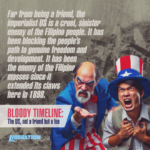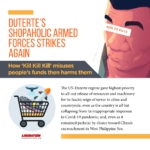A SAMPLING: 10 strategic areas of China encroachment in PH
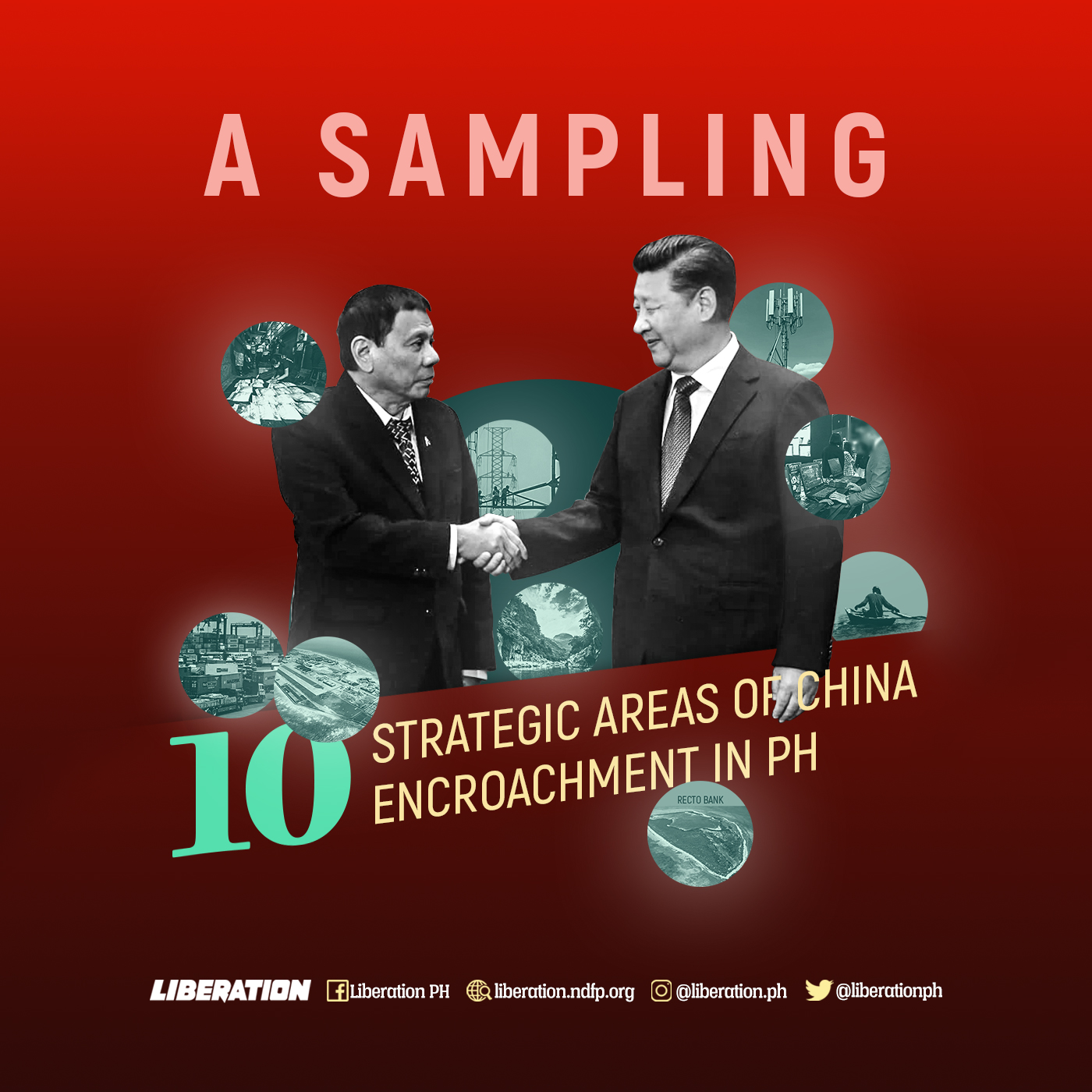
Below is a sampler list indicative of what (or how much) the US-Duterte regime has so far achieved as an imperialist puppet and bureaucrat capitalist. All the following demand thoroughgoing investigation, disclosures of what (and how much) rationalizations are behind his avidly welcoming China’s potential stranglehold of the country.
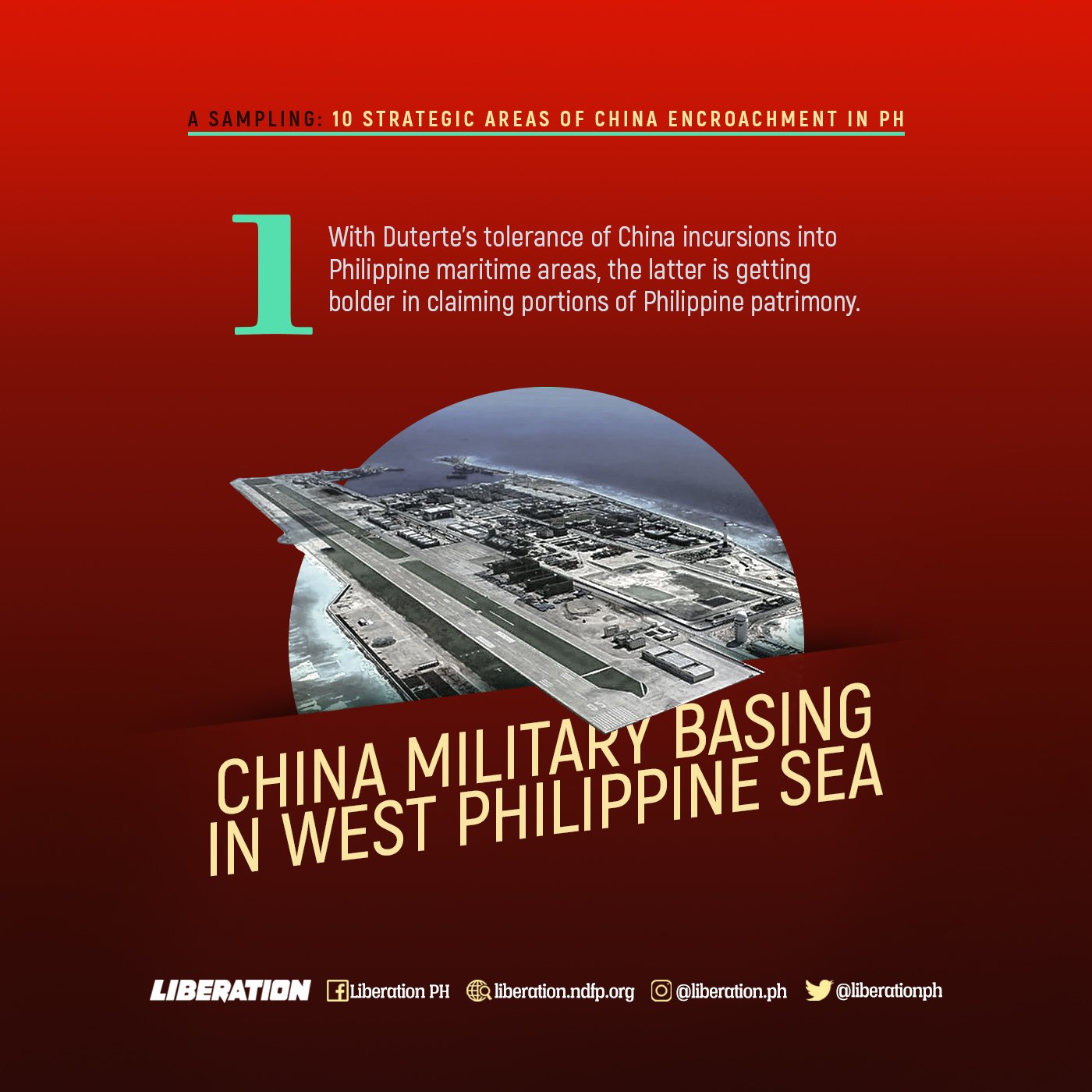
1. China military basing in WPS
With Duterte’s tolerance of China incursions into Philippine maritime areas, the latter is getting bolder in claiming portions of Philippine patrimony. Reports now point to the possibility that in crafting a Code of Conduct for all Asian claimants in the West Philippine Sea, China would likely insist on formalizing its claim and military basing in the Spratly islands and Panatag Shoal where it seems intent on setting up similar installations. Duterte has said they will not oppose China if they do that.

2. In Philippine rivers, mountains, IP ancestral lands
On top of earlier logging and mining concessions by US corporations that originally destroyed vast virgin forests and mountains in the Philippines, China is entering Sierra Madre via Kaliwa River dam project and Cordillera via Chico River Irrigation project. The projects include clearing parts of the forested mountains where the said rivers to be dammed are located. Deals with China include bringing their workers, steel, equipment and other construction requirements.
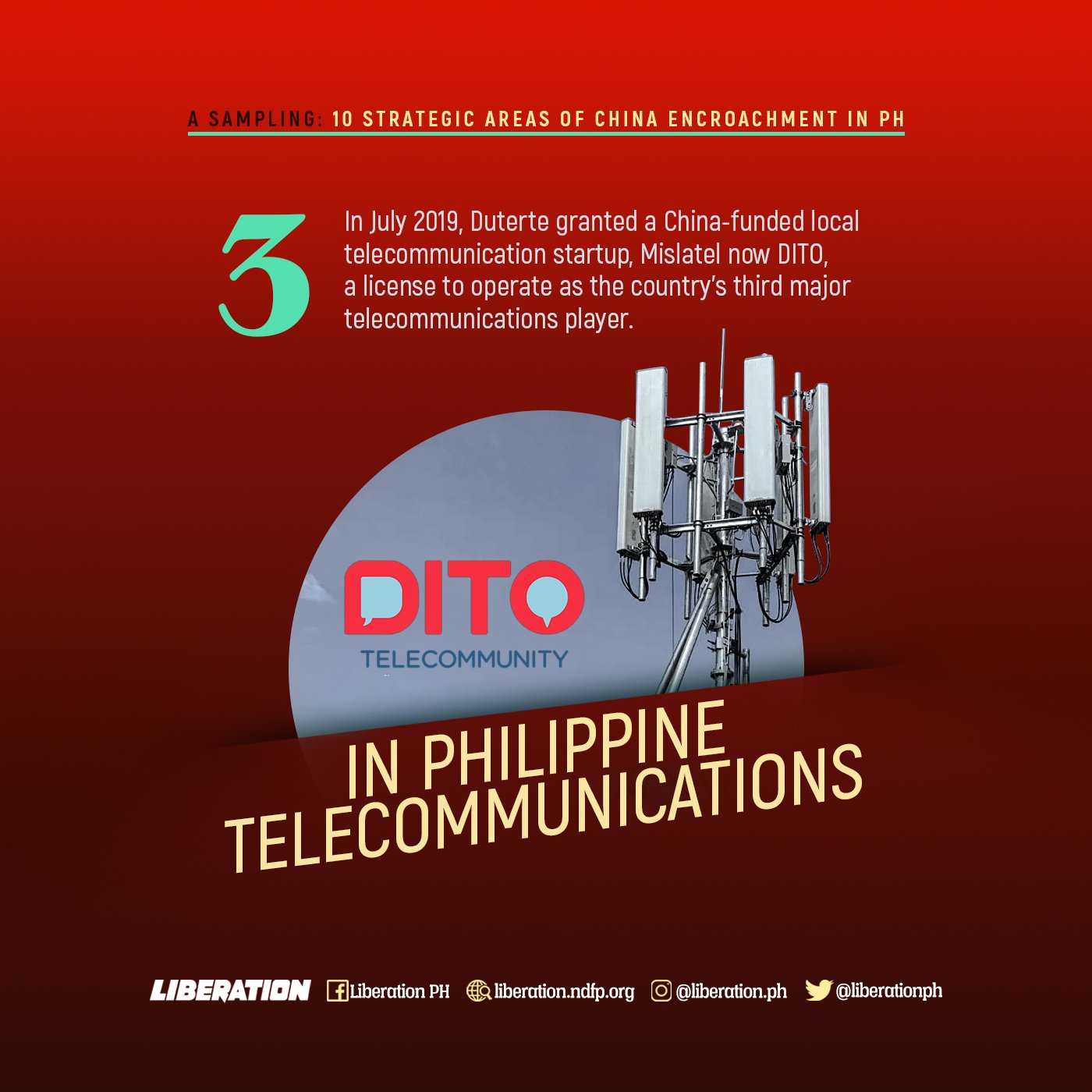
3. In Philippine telecommunications
In July 2019, Duterte granted a China-funded local telecommunication startup, Mislatel now Dito, a license to operate as the country’s third major telecommunications player. This, after Davao-based businessman Dennis Uy’s Mislatel signed a $5.4-billion investment deal with China Telecom to fund his company’s expansion in the Philippines.
With Duterte’s go-signal, the AFP changed its tune to signify openness to the deal for the said China-backed telecommunications, Dito Telecommunity Corp, to install its system, towers, and facilities within military bases in the country. Initially, Defense Secretary Delfin Lorenzana warned this will endanger the Filipinos’ privacy, security and a vital industry that should have been firmly under Philippine control.
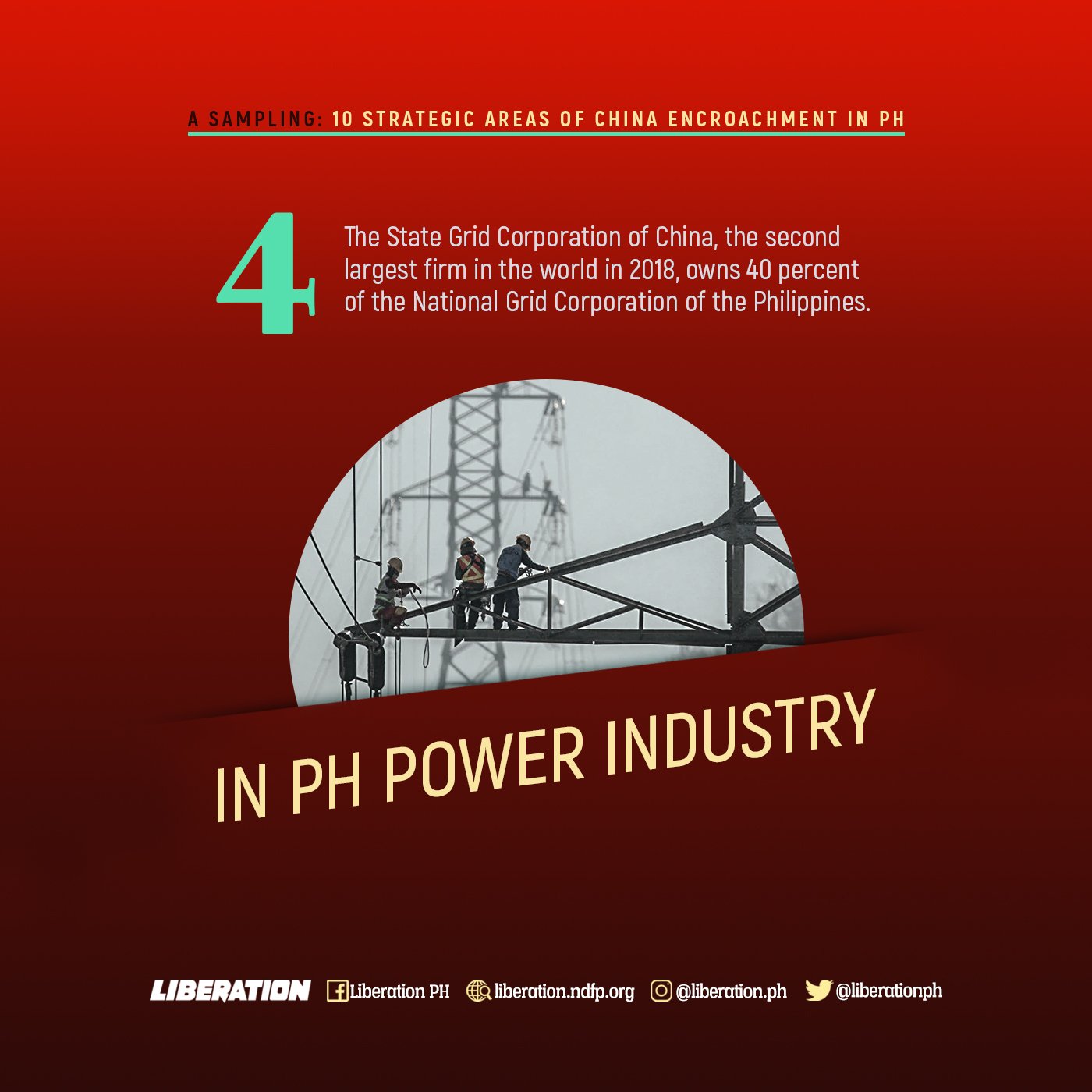
4. In power industry
The State Grid Corporation of China, the second largest firm in the world in 2018, owns 40 percent of the National Grid Corporation of the Philippines (NGCP). The Chinese firm is majority owner as the other owners, Filipino taipans Henry Sy and Robert Coyuito, each owns 30 percent. The Duterte government says the Filipinos are in control of the corporation, but reports said the Chinese are the ones maintaining and have operational control.
Privately owned NGCP is in charge of operating, maintaining and developing the Philippines’ state-owned power grid, an interconnected system that transmits gigawatts of power at thousand volts from power generators to consumers. NGCP holds the 50-year franchise and 25-year concession contract to operate and maintain the country’s transmission system. Their franchise began in 2009.
The NGCP went to Chinese owners in 2008 under former president Gloria Macapagal-Arroyo. Having a monopoly of this strategic utility, the NGCP profits immensely from power transmission.
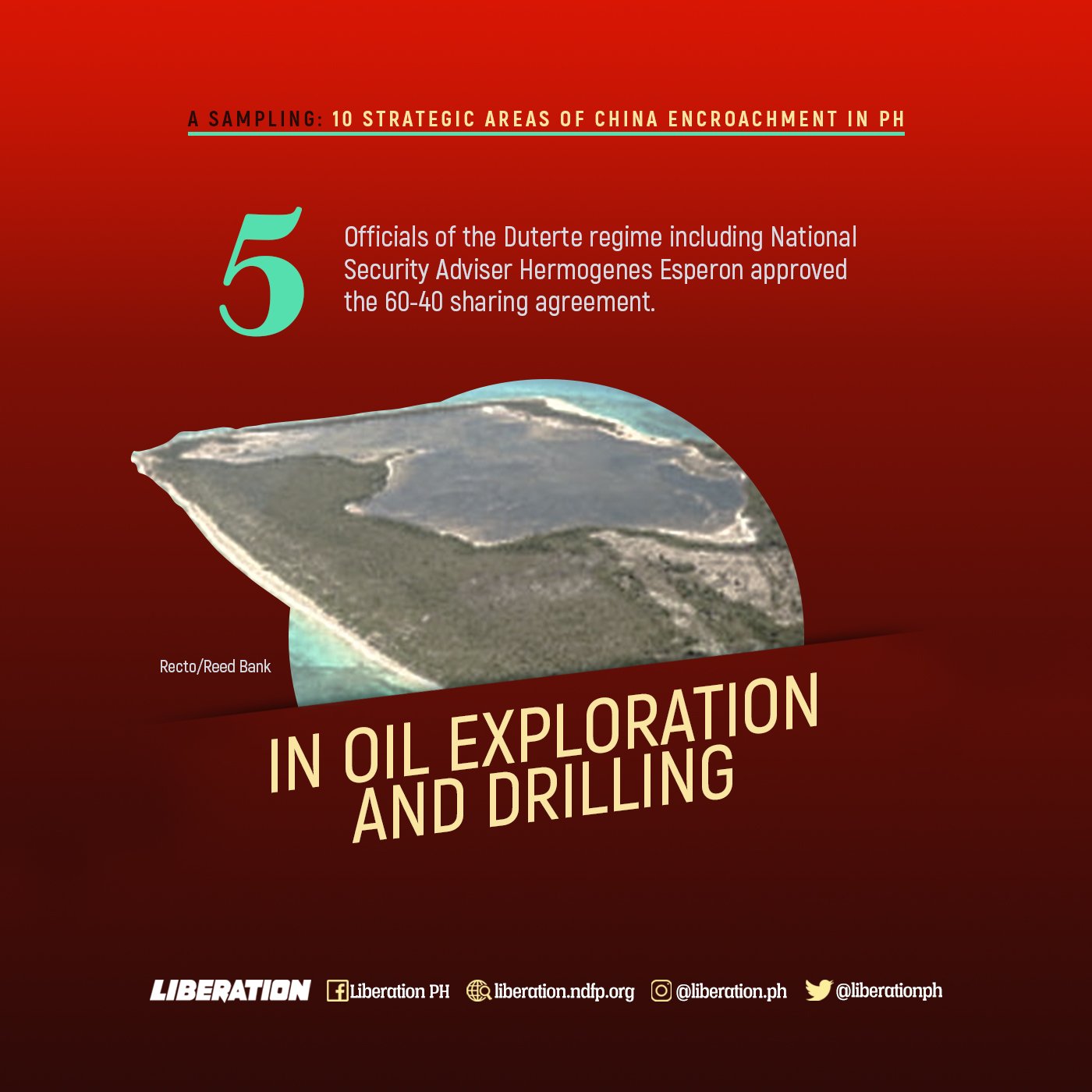
5. In oil exploration and drilling
Other countries ruled also by tyrants try to strike a balance between getting more out of their oil first for themselves and second for their population. In the Philippines, the would-be gains would first be cornered by China. One of the 29 deals Duterte signed with China during Chinese President Xi Jinping’s visit to Manila in November 2018 was the joint oil and gas exploration deal. Officials of the Duterte regime including National Security Adviser Hermogenes Esperon approved the 60-40 sharing agreement. Before 2019 ended, China and Duterte governments have signed the terms of reference and formed as well as convened the joint committee comprised of representatives from China and PH.
Filipinos from various walks of life condemn the deal saying it has all the makings of a lopsided agreement. Even if 60-40 sounds in favor of the Philippines, Filipinos have little to no safeguard against probable 100% control by China of the entire operation, considering it will lead the exploration and drilling activities, using its manpower and equipment.
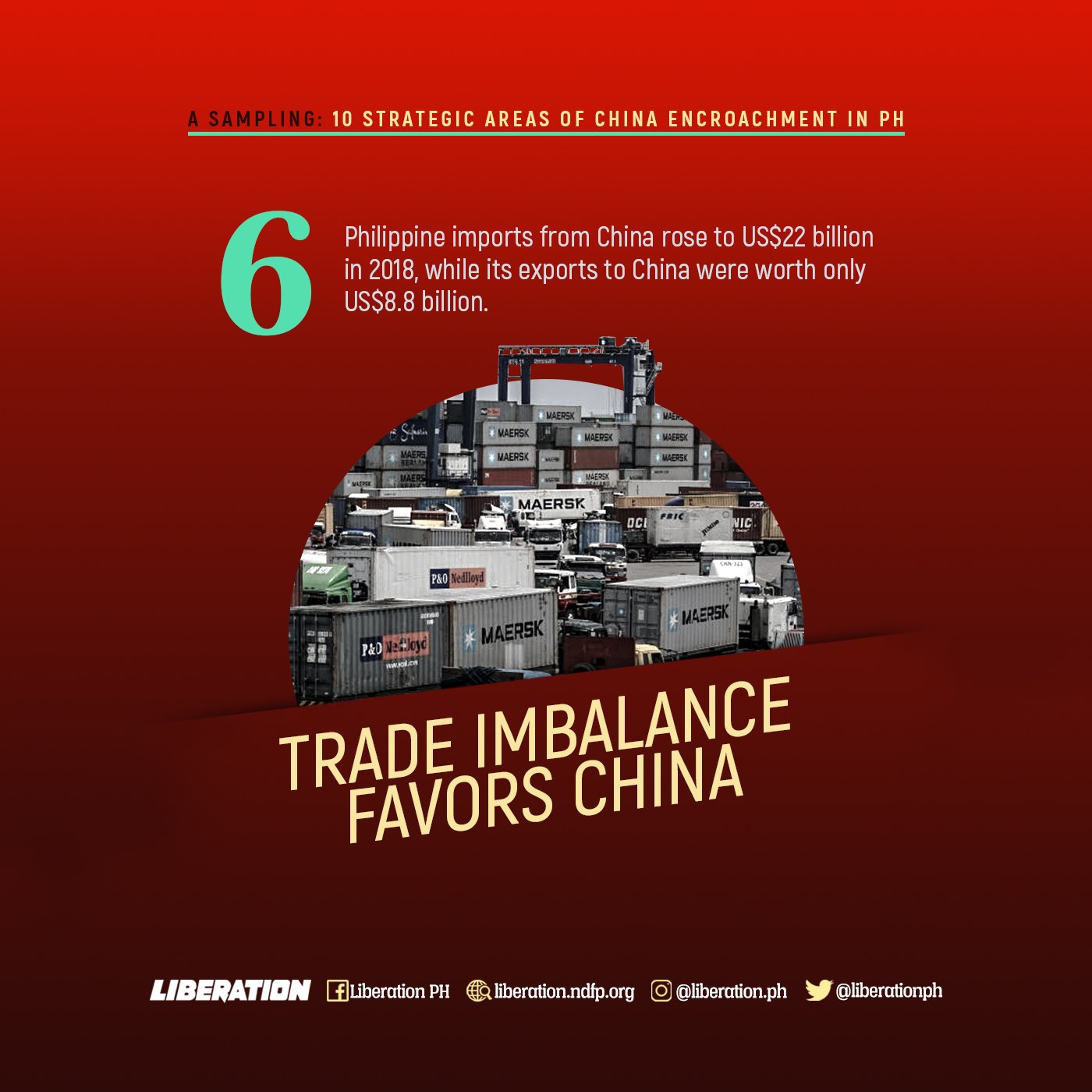
6. Trade imbalance favors China
Duterte and Communications chief Sec. Martin Andanar boasted that with their friendly ties with China, it is now a major trading partner. But data show this trade partnership is lopsided and in favor of China. Philippine imports from China rose to US$22 billion in 2018, while its exports to China were worth only US$8.8 billion.
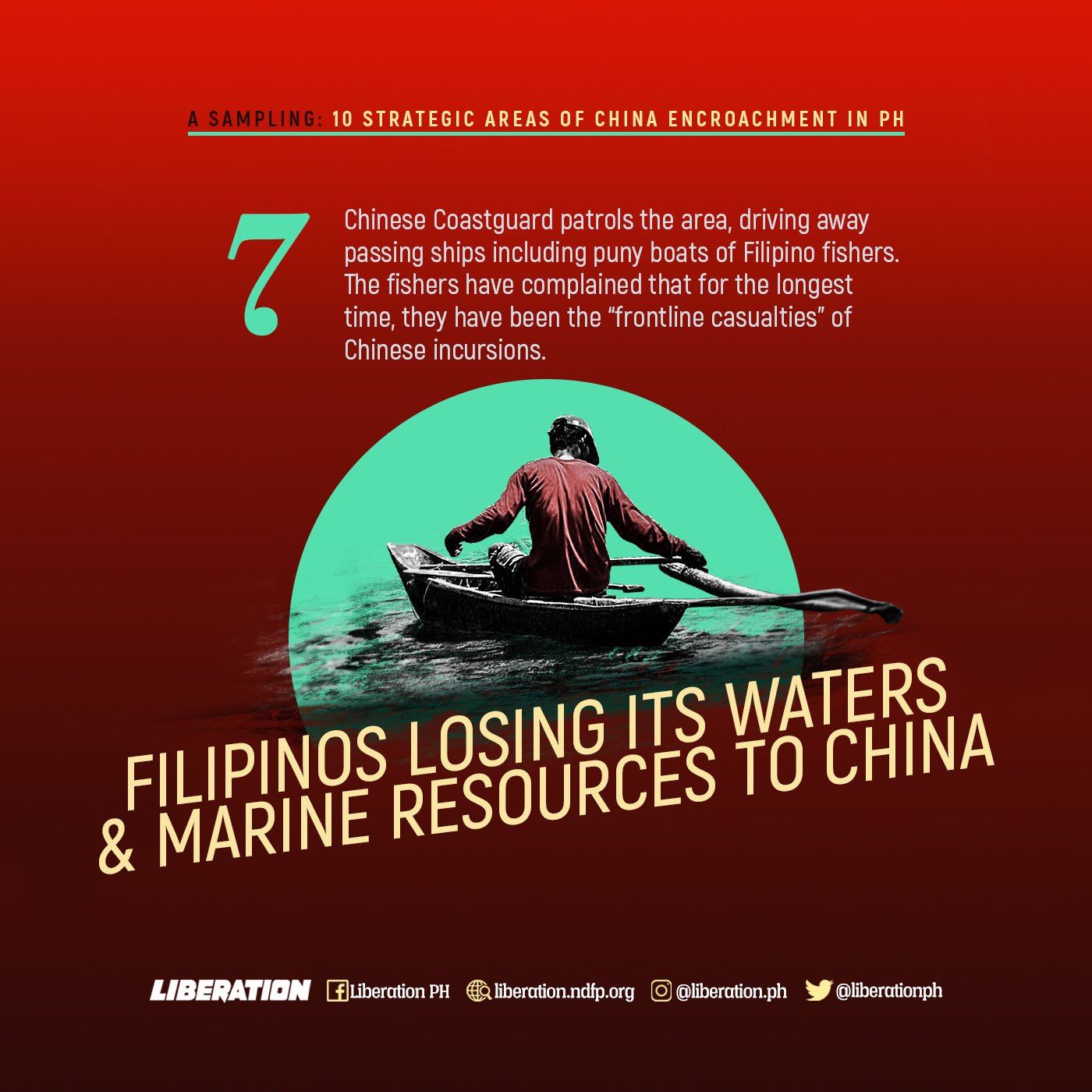
7. Filipinos losing its waters and marine resources to China
On its Spratlys military bases, China has installed surface-to-air missile systems in three artificial islands: the Kagitingan Reef (Fiery Cross), Zamora Reef (Subi Reef), and Panganiban Reef (Mischief Reef). These islands have become no-go zones for Filipinos because of Chinese military intimidation. Also, these installations have killed precious corals and the marine life around them.
China continues to bar Filipino fishers from Panatag Shoal and they are getting bolder at claiming ownership of it. Chinese Coastguard patrols the area, driving away passing ships including puny boats of Filipino fishers. The fishers have complained that for the longest time, they have been the “frontline casualties” of Chinese incursions.
Reclamation projects for China-funded infrastructure have also started to deprive many Filipinos of their homes and livelihood. There is a long-standing plan to reclaim at least 2,700 hectares of south Manila Bay for the P550 billion ($10 billion) Sangley Point International Airport (SPIA) in Cavite, 35 kilometers from Manila. Its proponent is the Cavite provincial government under a joint venture with China state-owned Chinese Communications Construction Co Ltd (CCCC) and local partner Lucio Tan-led MacroAsia Corp. Once awarded to the joint venture, the Chinese partner will effectively control the SPIA, reports said.
In another development, local fishers reported as of October 2019 that heavy equipment were being used to dump debris on a fishpond connected to Manila Bay and adjacent to the public cemetery in Bacoor City. No information has been posted on whether it is a public works project or a private construction activity. A Senate hearing previously unearthed a proposed 420-hectare Bacoor Reclamation Project covering the area. Faced with fishers’ protests, Environment Department officials committed to cancel the project as it is also detrimental to the Supreme Court writ of mandamus to rehabilitate Manila Bay.
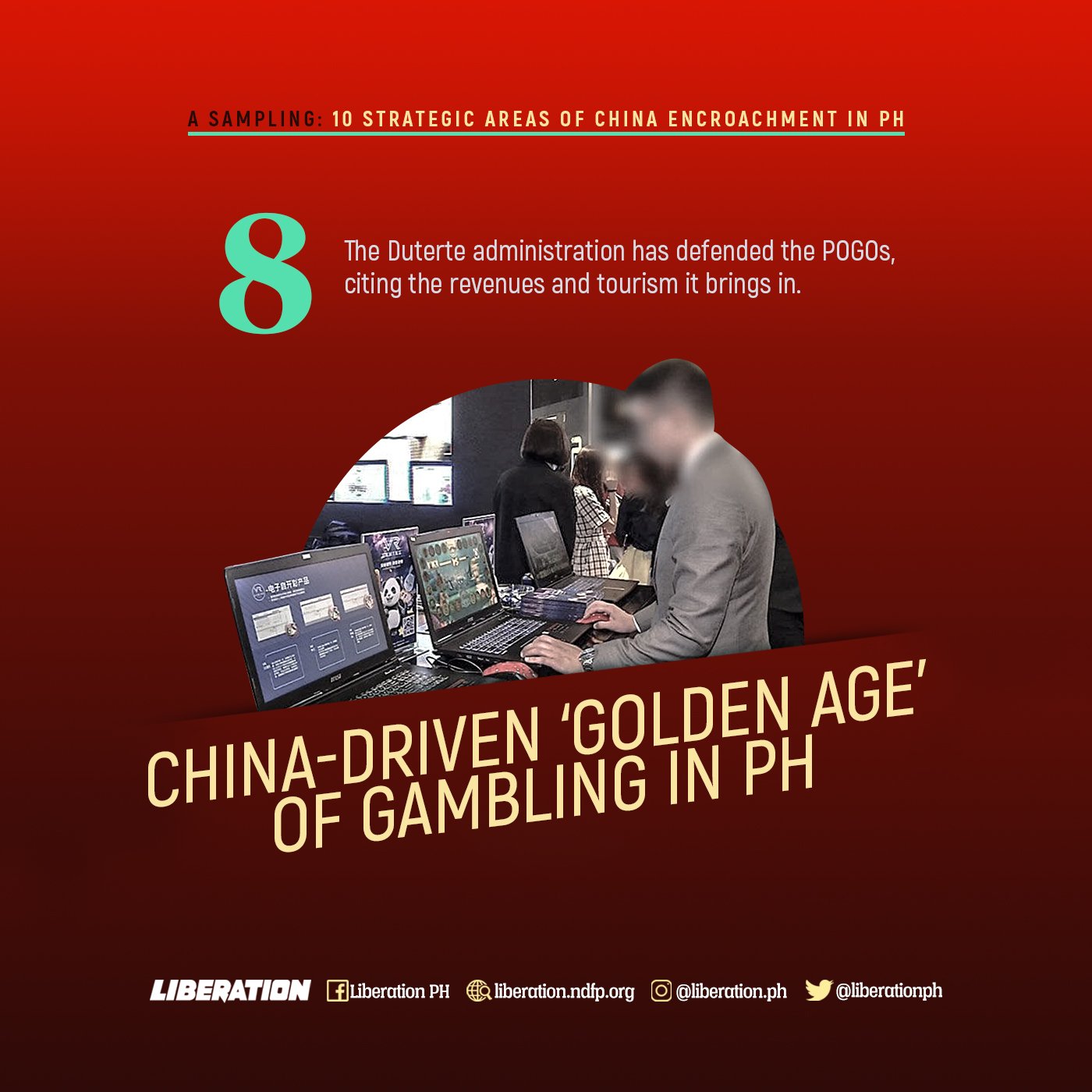
8. China-driven ‘Golden age’ of gambling in PH
Under Duterte government, the gambling industry enters a ‘golden age.’ Overall revenues quadrupled to $4.1 billion during the first three years of his presidency and the key driver is the boom in POGOs (Philippine offshore gaming operations). After China banned these gaming centers the operators have flocked to the Philippines and set up shops with Mandarin-speaking workers. In August 2019 a furor broke out about POGOs particularly on issues of undocumented Chinese workers, China’s request to curb the spread of Chinese-operated POGOs, and the US and the AFP warning against potential security threats with the gaming centers locating near Philippine (and US) military camps.
The Duterte administration has defended the POGOs, citing the revenues and tourism it brings in. Plans were then made to corral the gaming operators into “POGO islands,” to be built in Fuga island in Cagayan province and in Grande and Chiquita islands in Subic Bay.
POGO employs up to a hundred thousand workers, mostly Chinese. Members of the ruling class take differing positions on the POGO issue, driven by “security” concerns, “patriotic” concerns, and most likely also division of spoils. But they act nearly the same in not minding the deleterious impact on the masses of the construction of POGOs, or the working conditions of both the Chinese and Filipino workers who need to look out and guard against being played off against each other.
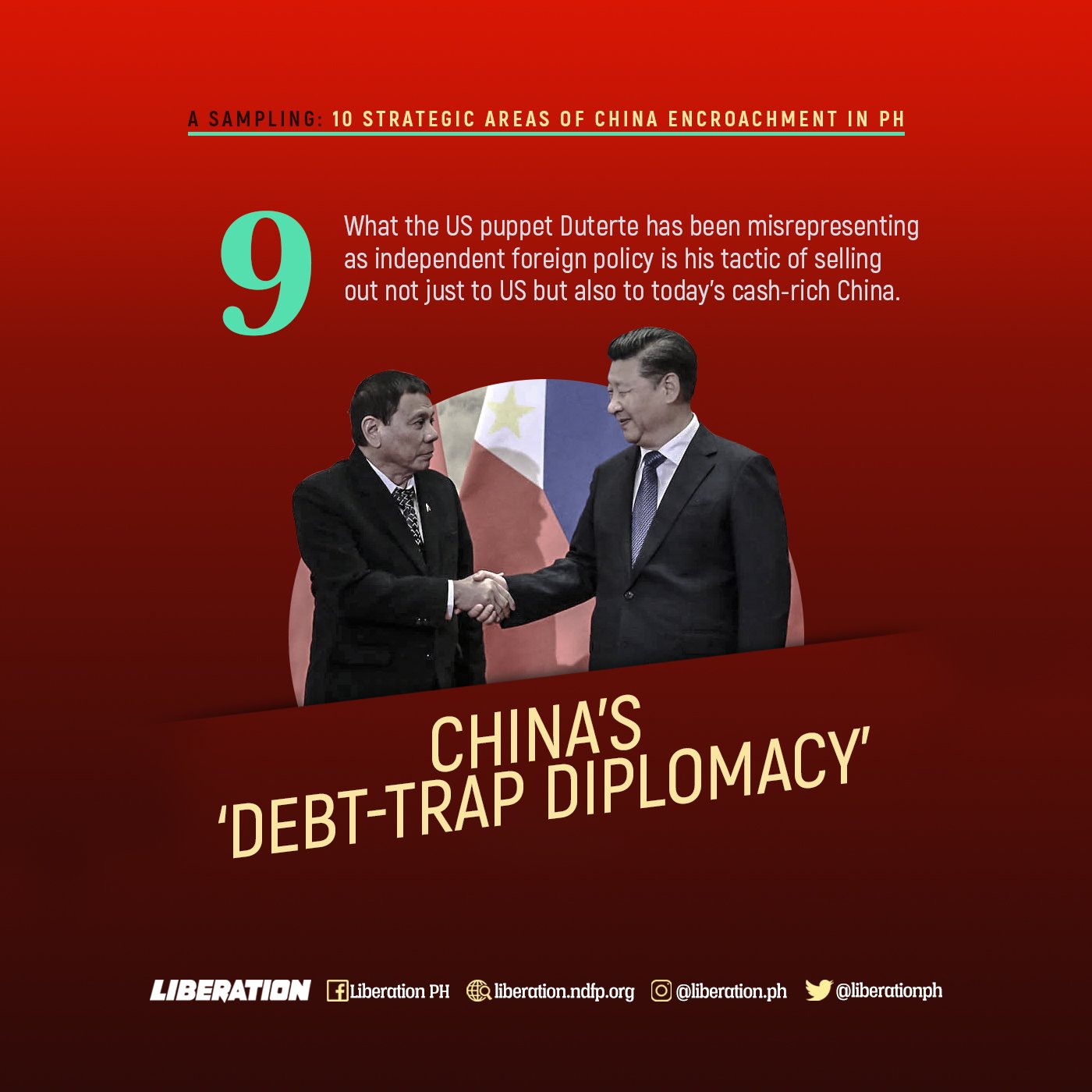
9. China’s ‘debt-trap diplomacy’
Some US officials unblushingly criticize China’s predatory loan deals used to expand influence globally. As if their banks and corporations aren’t doing the same, they warn countries and former colonies against China’s “debt-trap diplomacy,” its use of “opaque contracts and corrupt deals that mire nations in debt and undercut their sovereignty.”
They have a point, true, but it’s not coming from the goodness of their hearts but from self-interest and insecurity. China has embraced capitalism even if they still call themselves ‘communist’. Its President Xi Jinping is more assertive overseas and tightening controls at home—pretty much like what every other advanced capitalist country in the world is doing today. China no longer deals only with countries the US or the west have left out or considered “rogue states”. Now it is the most significant rival to the US, with which western capitalist countries have to compete more forcefully to maintain their old spheres of influence.
What the US puppet Duterte has been misrepresenting as independent foreign policy is his tactic of selling out not just to US but also to today’s cash-rich China. His administration craves funders for “Build, Build, Build” and China obligingly wants to integrate this program into its Belt and Road Initiative. The latter is a China spending/lending spree of up to $1 trillion in 17 countries in three continents. It traces the ancient path of Silk Road as it seeks to redirect the flow of trade and people traffic around China.
In the Philippines the China-funded infrastructure projects pose a double threat: 1) to the people hit by dislocation or forced landgrab of their communities and livelihood; and 2) to all Filipinos who will bear the added debt burden, and will have to cough up higher user-pay fees to use the infrastructure. Compounding the second is the threat pointed out by Justice Antonio Carpio: “In case of default by the Philippines in repayment of the loan, China can seize, to satisfy any arbitral award in favor of China, ‘patrimonial assets and assets dedicated to commercial use’ of the Philippine Government… including the oil and gas in the Philippine exclusive economic zone (EEZ) in the West Philippine Sea, and the gas fields in the Reed Bank.”
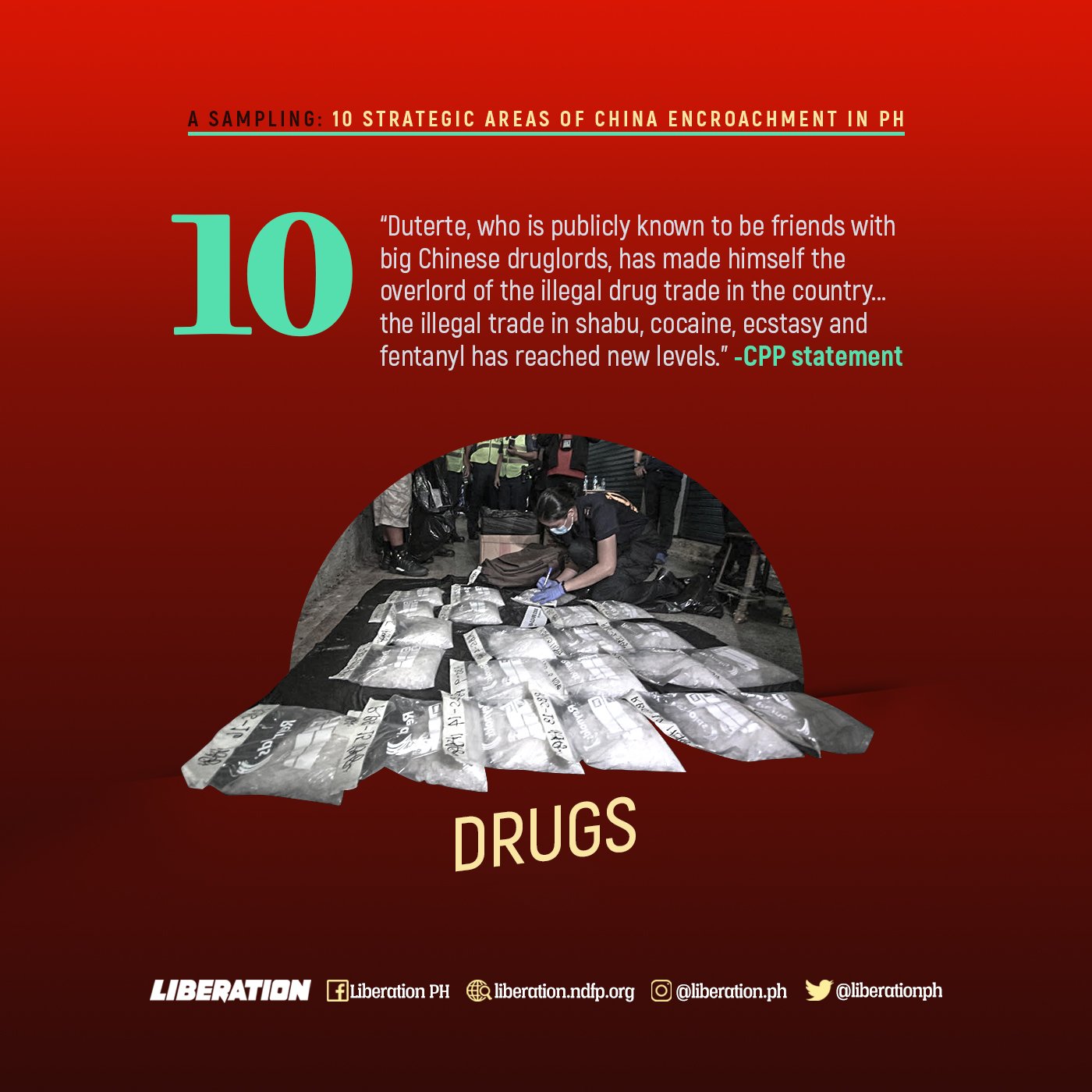
10. Drugs
In the Senate hearings last September about the police and military generals’ involvement in the drug trade, it was confirmed that Duterte’s top police officers were involved in criminal activities. In a statement, the CPP said it shows the so-called war on drugs is a big hoax foisted on the people.
The Senate hearings resulted in the untimely resignation of Police Chief Oscar Albayalde. Implicated in the issue of “recycling” drugs that were press-released to have been impounded by authorities, Albayalde left his position with full perks and retirement benefits intact.
This is not the first revelation of police and military involvement in the drug trade. Time and again, the “narco-lists” and witch-hunts or ‘cleanup’ of rival drug trade syndicates including their protectors in government positions have led to killings and arrests, including the alleged involvement of opposition Senator Leila de Lima in drug syndicates. Aside from using the drug war to desensitize the people to killings and sideline the opposition, the police and military have lately tried to use the tokhang-style joint operations against unarmed activists.
On this, the CPP says: “Duterte, who is publicly known to be friends with big Chinese druglords, has made himself the overlord of the illegal drug trade in the country by using the police and his police-controlled vigilantes to make every syndicate kneel to his power. He has assigned loyal officers in the AFP to control large-scale smuggling through the Bureau of Customs. Under Duterte, the illegal trade in shabu, cocaine, ecstasy and fentanyl has reached new levels.”
Crime and politics meld in the PNP, as well as in the AFP, adds the CPP, as it points to how the police and military have repeatedly proved to be “a battleground of rival political cliques and criminal syndicates in the illegal drug trade, jueteng and other forms of illegal gambling, prostitution, human trafficking and others.” The police and military officers’ loyalty to one or another rival criminal network, and at the same time, to one politician or another rival dynasty or party, is the thread that connects the spate of killings even of politicians already in jail or under police protection.
Treasonous Duterte
The Filipino people need to deliver an important message to the Duterte administration. His regime is the actual terrorist and persona non grata. His rule is giving rise to monstrous problems for Filipinos, endangering them now and in the future. What his regime is doing to the people, the country, and environment spurs the people’s wrath and calls for justice.
Under Duterte, the Philippines continues to be in an economic stranglehold of foreign capital and US-sponsored neoliberal economic policies. The country remains a backward neocolony—with the vast poor in dire strait. Add to US and allied superpowers’ established stakes in the country’s economy, government and military, China is also establishing footholds via debts, investments and illegal occupation.
Duterte has turned to China to add to his bureaucrat loot, and paved the way to increased US presence to prop up the puppet government and secure investments. The U.S. military aid to the Philippines amounting to $193.5 million in 2018 alone (9.77 trillion PHP) has helped fund state-orchestrated attacks on the Filipino people.
But Duterte’s war against revolutionaries is only further exposing him and the AFP and police for cowardice. They conduct focused and synchronized armed operations against unarmed and legitimate progressive groups, shrinking the democratic space they claim to defend as they weaponize the civilian bureaucracy against critics.
Like any other puppet president, Duterte cannot brook ouster moves, public protests and opposition. An untimely exit from Malacañang will cut his loot, clip the wings of his clique and small dynasty of local politicians, and open him to prosecution for his crimes. So, he is turning more fascist as his term’s end nears.
Duterte and his ilk seriously need to be taught lessons in history. They cry to get a taste of what the Filipino people do to tyrants. It is high time he gets booted out by the people. His rampage deserves no less. ###
Like and Follow our NEW FB PAGE
bit.ly/liberationph


